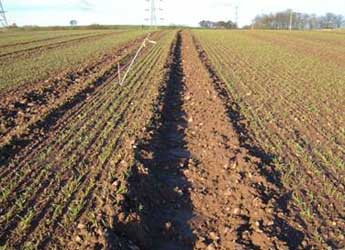United Kingdom
December 5, 2012
Did you know that our most valuable natural asset is the soil beneath our feet? On World Soil Day 2012, researchers at the James Hutton Institute say soil is a key resource for food security and human sustainability. As the world’s population continues to grow, we face a huge challenge in managing our soils to produce more food from less land.

According to the Food and Agriculture Organisation of the United Nations (FAO), 5 December is a day for celebrating the importance of soil as a critical component of natural systems and as a vital contributor to human wellbeing through its contribution to food, water and energy security and its role in mitigating biodiversity loss and climate change. This year’s theme will focus on “Securing healthy soils for a food secure world.”
.We will have to work hard to reverse losses in both the quality and quantity of the global soil resource through improved management practices in agriculture and other land uses, halting inappropriate land uses and, vitally, the restoration of degraded land. Soil degradation is now recognised as a primary limitation to poverty alleviation in many low income countries.
Although it may look dull to the casual observer, soil is teeming with life which not only helps plants grow but also helps to control the flow of water and the exchange of greenhouse gases with the atmosphere. But as yet we don’t fully understand the diversity of life beneath our feet. In contrast, soil can tell us about our past as well as support our future as it is a valuable record of past climates and human activity through the ages.
Researchers at the James Hutton Institute are at the forefront of soil science carrying out research to develop ways to improve our use of this key resource. Understanding how soils function and how they can be managed to improve crop yields is essential for the sustainable intensification of agriculture across the world.
Climate change is already changing the way we farm the land and predicting how soils will change as the climate warms and rainfall patterns alter is an important part of our research. Experts at the Institute are also developing smartphone technology to enable non-experts to analyse soils in the field and provide farmers with soils information to help them manage soil quality. At the other end of the scale, our researchers are investigating molecular interactions between plant roots and soil particles to improve knowledge on how plants obtain nutrients from soils and help improve the use of fertilisers.
.Another major event for Institute scientists this year was the development of see-through soil, which will allow the study of plant roots in a way not possible before. Dr Lionel Dupuy, who led the research, said: “There are many different scientific disciplines that could benefit from this research.”
The James Hutton Institute also oversees the National Soil Inventory of Scotland, which classifies soils across the country and assesses their ability for forestry, agriculture, upland grazing or a range of other uses. We have used recently collected data to determine if carbon is being lost from soils that could contribute to global warming and diminish soil productivity. Future projections of the impacts of climate change to Scotland's soils are also being modelled using this unique database we have developed.
Earlier this year, scientists from the Institute were at the Planet Under Pressure conference in London, which aimed to provide society with the knowledge necessary to assess the risks humanity is facing from global change, focussing specifically on climate, ecological degradation, human wellbeing, planetary thresholds, food security, energy, governance across scales and poverty alleviation.
During the event, Professor Iain Gordon, Chief Executive, co-chaired a session called “Securing global biodiversity: a human imperative for a sustainable planet”, while Dr Paul Hallett, head of the Delivering Sustainable Production Systems Research Theme, and Dr Helaina Black, who is also president of the British Society of Soil Science, co-chaired a session called “Earth under pressure: maximising the value of soil”.
.Also, and very much in tune with the FAO-designated theme for World Soil Day 2012, soil scientists at the James Hutton Institute and partners NIAB TAG are currently conducting an experiment in order to achieve increased cereal yields for UK farmers and lower greenhouse gas emissions. The goal is to establish best practice for a safe, sustainable intensification of agricultural production. This means UK farmers, agronomists and policymakers will have access to data from science carried out in Britain that addresses the agronomic, environmental and economic impacts of soil management practices.
Project leader Dr Paul Hallett said: “With our partners at NIAB TAG we are able to combine cutting edge science at the crop-soil interface with direct delivery of practical solutions to farmers. The soil management experimental platforms at the James Hutton Institute and NIAB TAG provide an excellent opportunity to evaluate what is best for UK conditions.”
As modern agriculture needs to develop to sustain the planet for different purposes, our soil researchers are working not only in the improvement of crop production, but also in areas such as biodiversity conservation, water quality, flooding control, soil forensics, land capability, soil surveying and monitoring, as well as policy advice in Scotland, the UK and Europe. This has a clear objective: to ensure that soil can feed the world, protect the environment and adapt to climate change while ensuring productive farming.
.